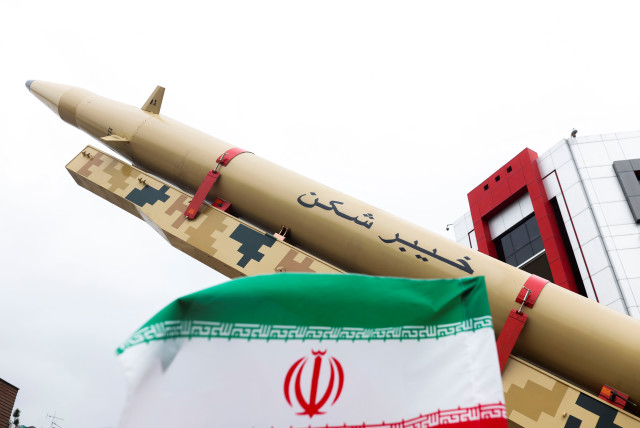We must kill the Iran nuclear deal now and snapback sanctions - opinion

The deal can’t be saved, which is why our European allies should kill it altogether and move on to a policy that restores deterrence and imposes costs on Iran
The International Atomic Energy Agency just released a stunning report that concludes that Iran’s path to weapons-grade enriched uranium is now measured in just days, 12 days to be exact. As Iran is barreling closer than ever to a nuclear bomb, it continues to fuel terrorism, threaten the freedom of navigation, and violently oppress its people. Just days ago, the United States Navy, working with the United Kingdom’s Royal Navy, thwarted an effort by Iranian naval vessels to harass and potentially hijack yet another ship transiting the Strait of Hormuz.
Where are the consequences and who is holding Iran accountable? While the Islamic Republic of Iran grows bolder and more violent, the Biden administration and our European allies are responding by clinging desperately to the past, holding onto the absurd hope that the Iran nuclear deal can somehow be revived. The deal can’t be saved, however, which is why our European allies should kill it altogether and move on to a policy that restores deterrence and imposes costs on Iran. Every day we continue to maintain the fiction that this failed and flawed deal can be revived, is a day that Iran grows more dangerous.
The path forward is clear: given the existing dispute over whether the US can initiate snapback, it now falls upon our European allies to do so immediately. The UK, Germany, or France, collectively referred to as the “E3,” can act today to unilaterally reimpose all pre-nuclear deal sanctions on Iran. The avenue for them to do so is explicitly laid out in UN Security Council Resolution 2231. Given Iran’s verifiable and significant noncompliance with the deal, the only question to ask is why haven’t they done so already?
Why have we not initiated snapback sanctions on Iran yet?
LAST WEEK in Congress, Congressman Josh Gottheimer joined me in a bipartisan letter to our “E3” allies urging them to take this responsible step to initiate snapback. It was the first significant bipartisan acknowledgment that snapback is the necessary response to Iran’s actions.
Yet sadly, some are reluctant to acknowledge this reality. Some policymakers and advocacy groups are even calling for snapback sanctions, only if Iran reaches an enrichment threshold of 90 percent. Not only would this be almost 24 times the limit allowed by the nuclear deal, it would also mean that Iran has successfully reached the threshold of weapons-grade uranium. This stance is dangerous and irresponsible, and only benefits the Iranian regime.
First and foremost, this position minimizes the extreme nature of Iran’s existing violations of the nuclear deal. As a reminder, the Joint Comprehensive Plan of Action (JCPOA) only permitted Iran to enrich uranium up to 3.67%, the amount needed for a nuclear power plant. Suggesting that it is now acceptable for Iran to continue enriching uranium to 89.9% without consequence, sets a dangerous new precedent that weakens the non-proliferation regime.
Second, it should go without saying, but appeasing rogue actors in this way simply does not work, ever. It did not work with previous despots, and it will not work with those abusing power now. We cannot continue to cede ground and give Iran more leverage. The 2015 nuclear deal moved Iran’s acceptable nuclear enrichment limit from 0% to 3.67%. It would be entirely irresponsible to now push this limit even higher to 89.9%.
Finally, waiting until Iran hits a 90% enrichment threshold to trigger snapback is too little, too late. At that point, Iran will already have weapons-grade enriched uranium. Iran must face costs now for its actions, if we are to expect a change in behavior.
With Iran barreling toward enough enriched uranium for a bomb, we are already short on time. Sitting on our hands and waiting until Iran reaches 90% enrichment is a dangerous and counterproductive delay tactic that benefits one party: the Islamic Republic of Iran. There should be no delay, which is why our E3 allies should act now to initiate snapback.
The writer is a Republican member of the US House of Representatives from New York. She is a member of the House Ways and Means Committee, and in 2021-2022, was a member of the Foreign Affairs Committee. She is a leading voice in Congress on countering the Iranian regime.
Jerusalem Post Store
`; document.getElementById("linkPremium").innerHTML = cont; var divWithLink = document.getElementById("premium-link"); if (divWithLink !== null && divWithLink !== 'undefined') { divWithLink.style.border = "solid 1px #cb0f3e"; divWithLink.style.textAlign = "center"; divWithLink.style.marginBottom = "15px"; divWithLink.style.marginTop = "15px"; divWithLink.style.width = "100%"; divWithLink.style.backgroundColor = "#122952"; divWithLink.style.color = "#ffffff"; divWithLink.style.lineHeight = "1.5"; } } (function (v, i) { });

